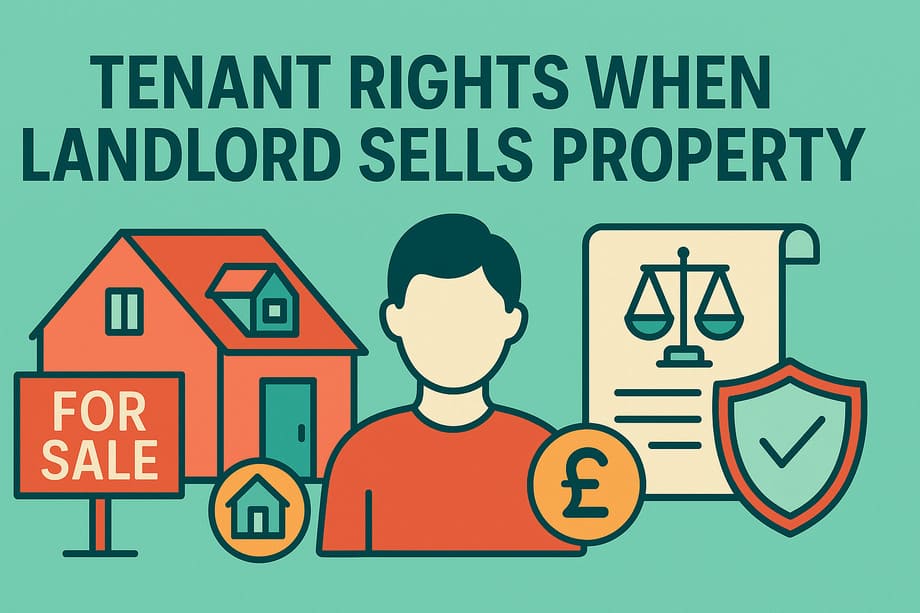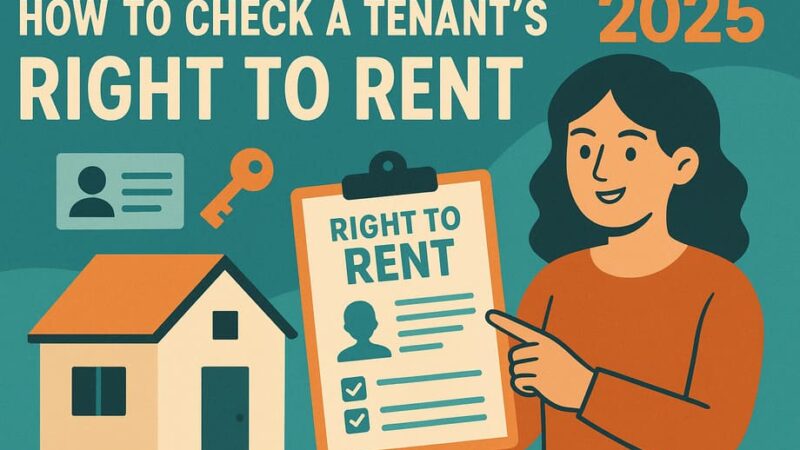Tenant Rights When Landlord Sells Property

Discovering that your landlord intends to sell the property you call home can feel unsettling. Questions flood your mind: Will you be forced to move? What happens to your lease? Can the new owner change your rent? The uncertainty is completely understandable, but here’s the reassuring truth as a tenant in the UK, you have substantial legal protections when your landlord decides to sell.
The key fact to remember: your tenancy agreement doesn’t vanish when ownership changes hands. Whether you’ve been renting for months or years, your rights remain intact throughout the sale process and beyond. This comprehensive guide will walk you through everything you need to know about protecting your position as a tenant when your landlord sells.
Can a Landlord Sell a Property With Tenants Living There?
Yes, absolutely. In the UK, private landlords have the legal right to sell their property with tenants still living in it. This is actually quite common in the buy-to-let market, where investor buyers actively seek properties with reliable tenants already in place.
When a property sells with tenants “in situ” (meaning you’re still living there), the buyer automatically inherits all existing tenancy agreements. This is legally binding the new owner cannot simply decide they don’t want to honour your tenancy. They become your new landlord from the moment they complete the purchase, taking on all the rights and responsibilities that come with that role.
Many buyers see tenanted properties as attractive investments because they provide immediate rental income without the hassle of finding new tenants. However, some buyers may have different plans for the property, which brings us to the important question of what happens to your lease agreement.
What Happens to Your Lease Agreement?
Your tenancy agreement survives the sale intact. The law is crystal clear on this: a change of ownership does not affect your legal right to remain in the property. Your lease continues with exactly the same terms, conditions, rent amount, and end date as before.
Fixed-Term Lease Rights
If you’re in the middle of a fixed-term tenancy (such as a 12-month contract), you have the absolute right to remain in the property until that fixed term expires. The new landlord cannot terminate your tenancy early simply because they’ve bought the property.
Key protections for fixed-term tenants include:
- Right to stay for the full term: Even if the new owner wants you out, they must wait until your fixed term naturally expires
- Same rent and conditions: Nothing changes about your monthly rent or tenancy terms
- Deposit protection continues: Your deposit remains protected in the same government-approved scheme
- No forced new agreements: You cannot be compelled to sign a new tenancy agreement (though you may be asked to)
Important note: If your tenancy agreement contains a break clause allowing early termination, the new landlord could potentially use this, but they must still follow the proper legal procedures and notice periods specified in your contract.
Month-to-Month Tenancy Rules
If you’re on a rolling monthly tenancy (also called a periodic tenancy), your rights continue unchanged under the new ownership. The new landlord inherits your tenancy on exactly the same terms as before.
However, periodic tenancies do offer landlords more flexibility for legitimate evictions. Under current law, if the new owner wants to regain possession for legitimate reasons (such as wanting to live in the property themselves), they could serve you with a Section 21 notice, giving you two months’ notice to leave.
Upcoming changes: The government’s Renters’ Rights Bill, expected to become law in 2025-2026, will abolish Section 21 “no-fault” evictions entirely. Once implemented, landlords will only be able to evict tenants for specific reasons, such as rent arrears or property damage.
Do Tenants Have to Move Out?
No, you do not have to move out simply because your landlord is selling. This is one of the biggest misconceptions tenants have about property sales. Your legal right to occupy the property continues regardless of who owns it.
Here are the only circumstances where you might need to move:
During a Fixed-Term Tenancy:
- The new landlord serves a valid Section 21 notice (only possible in certain circumstances and with proper notice)
- You breach your tenancy agreement (e.g., persistent rent arrears, property damage, antisocial behaviour)
- There’s a valid break clause in your contract that’s properly exercised
During a Periodic Tenancy:
- The new landlord serves a Section 21 notice giving two months’ notice (though this is being abolished)
- Ground for eviction under Section 8 (fault-based reasons)
- You agree to leave voluntarily
Remember: Even if you receive a valid eviction notice, you don’t have to leave immediately. The landlord must follow the proper legal process, which typically takes several months and may require a court order.
Tenant Rights During Viewings and Inspections
One of the most intrusive aspects of your landlord selling is the inevitable stream of potential buyers wanting to view your home. However, you have strong legal rights controlling when and how these viewings can take place.
Your fundamental right: You have the right to “quiet enjoyment” of your rental property. This means your landlord cannot turn your home into a show house without your cooperation.
Key viewing rights include:
- 24 hours written notice: Your landlord or their estate agent must give you at least 24 hours’ advance written notice before any viewing
- Reasonable times only: Viewings must be scheduled at reasonable times—not early morning, late evening, or at times that significantly disrupt your life
- Your permission required: You are not legally obliged to allow viewings unless your tenancy agreement specifically states otherwise
- Right to refuse: You can say no to viewing requests, especially if insufficient notice is given
Practical considerations: While you have the right to refuse viewings, being completely uncooperative may strain your relationship with your landlord. Consider offering alternative times that work better for you, or requesting that viewings be clustered into specific days to minimise disruption.
Check your tenancy agreement: Some agreements include clauses about allowing viewings, particularly towards the end of a tenancy. However, even with such clauses, viewings must still be arranged with proper notice and at reasonable times.
Can the New Owner Change the Lease?
No, the new owner cannot unilaterally change your existing lease terms. Your tenancy agreement is a legally binding contract that the new landlord inherits along with the property. They become bound by its terms just as much as you are.
What stays the same:
- Monthly rent amount
- Tenancy duration and end date
- All terms and conditions in your original agreement
- Deposit amount and protection arrangements
- Your rights and responsibilities as outlined in the lease
What the new landlord might try (but cannot legally enforce):
- Asking you to sign a completely new agreement
- Attempting to increase rent outside the legal process
- Adding new restrictions or conditions
- Changing payment methods or frequencies without agreement
If asked to sign a new agreement: You should be extremely cautious. While the new landlord may present this as a formality, signing a new agreement could potentially worsen your position. You are under no legal obligation to sign anything. If you do consider signing a new agreement, scrutinise every term carefully and consider seeking legal advice.
Legitimate changes: The only ways a new landlord can change lease terms are:
- Following proper rent increase procedures (if no fixed term prevents this)
- Mutual agreement where you both consent to changes in writing
- At the natural end of a fixed-term tenancy when offering renewal
What to Do If Your Landlord Sells While You’re Renting
Being proactive and informed is your best strategy when navigating a property sale. Here’s your step-by-step action plan:
Immediate Steps:
- Document everything: Keep records of all communications about the sale, viewing requests, and any interactions with estate agents or potential buyers
- Know your new landlord: Your old landlord should provide you with the new owner’s name and contact details. The new landlord has two months from purchase to formally notify you of the ownership change
- Confirm deposit protection: Ensure your deposit remains protected in a government-approved scheme. The responsibility transfers to the new landlord, but the protection must continue
- Review your tenancy agreement: Refresh your memory of your rights and obligations, paying particular attention to any clauses about viewings or early termination
Ongoing Communication:
- Be reasonable about viewings: While you can control when they happen, try to accommodate reasonable requests to avoid unnecessary conflict
- Maintain the property: Continue caring for the property as outlined in your tenancy agreement
- Pay rent as normal: Continue paying rent to your current landlord until officially notified of the change
If Problems Arise:
- Harassment concerns: If you feel pressured or harassed by frequent viewing requests or attempts to make you leave, document everything and contact Citizens Advice or Shelter
- Illegal eviction attempts: If anyone tries to force you to leave without proper legal process, this is illegal. Contact your local council immediately
- Deposit issues: If there are concerns about your deposit during the transition, contact the relevant deposit protection scheme
Get Professional Help When:
- You receive any eviction notices
- The new landlord tries to change your lease terms
- You’re unsure about your rights in your specific situation
- You feel your rights are being violated
Know Your Support Resources:
- Citizens Advice: Free, impartial guidance on housing rights
- Shelter: Specialist housing charity with extensive online resources and helplines
- Local council housing departments: Can provide advice and assistance with housing issues
- Legal aid: May be available for serious housing disputes
Final Thoughts – Protecting Tenant Rights
While discovering your landlord is selling can initially feel unsettling, understanding your rights should provide significant reassurance. The law firmly protects tenants during property sales, ensuring you cannot be arbitrarily displaced from your home.
Key takeaways to remember:
- Your tenancy survives the sale: Ownership changes don’t affect your legal right to remain in the property
- You control viewing access: While cooperation helps, you have the right to reasonable notice and can refuse unreasonable requests
- Nothing changes without proper process: Rent, terms, and conditions remain exactly the same unless legally changed through proper procedures
- You don’t have to sign anything: New landlords cannot force you to accept new agreements or terms
The bigger picture: With upcoming legislative changes abolishing Section 21 “no-fault” evictions, tenant protection is actually strengthening. The Renters’ Rights Bill will provide even greater security, making it harder for landlords to evict tenants without legitimate grounds.
Stay informed and proactive: The rental market is evolving rapidly, with enhanced tenant protections on the horizon. By understanding your current rights and staying informed about upcoming changes, you’ll be well-equipped to navigate any challenges that arise when your landlord decides to sell.
Remember, thousands of tenanted properties change hands every year in the UK, and the vast majority of these transitions proceed smoothly with tenants’ rights fully protected. By knowing your rights, maintaining open communication, and seeking help when needed, you can navigate this process with confidence.
If you’re ever unsure about your specific situation, don’t hesitate to seek professional advice. Your right to secure housing is fundamental, and numerous organisations exist to help protect and enforce these rights.
Last Updated on September 8, 2025 by James Cartwright







